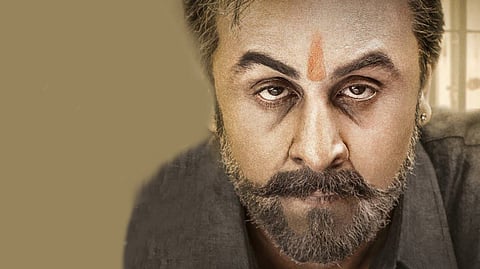'Sanju' is flawed, myopic, sloppy film-making
This is one film which is an unapologetic paean to Dutt and his spoilt ways

Agreed, I am ten days late in watching Ranbir Kapoor’s much-hyped biopic Sanju that chronicles the turbulent life of actor Sanjay Dutt. And I am fully aware that my opinions are not going to make a dent on the film’s performance at the box office. But having seen the Raj Kumar Hirani directorial last night, I am compelled to write that Sanju is one of the most flawed, myopic biopics that’s been rolled out by Bollywood in recent times.
Biopics in Hindi cinema don’t enjoy a huge amount of credibility. They famously gloss over harsh realities and have a tendency to air-brush the warts and moles of their subjects. They are always keen to trump up the triumph of the underdog narrative. The near-destruction to redemption arc is always a popular narrative.
I expected Hirani’s Sanju to skim over Dutt’s involvement in the 1993 Mumbai serial blasts. But what I did not expect is an unapologetic display of selective truth telling and painting Dutt as this misguided man-child.
Sanju, which is out in the UAE cinemas now, is a blatant example of image-sculpting by a director who enjoys immense goodwill among his fans.
Here’s a subject, Sanjay Dutt, who was convicted of buying firearms from the bombers linked to blasts that killed 257 people and injured 713. But the biopic will tell you that his intentions were noble and that he was clueless about its tragic ramifications. The film will also school you that he purchased the firearms to protect his family during the Hindu-Muslim riots and that was a convenient celebrity scapegoat.
The film is also intent on downplaying his alleged involvement in the blasts and painting him as a poor, little rich boy.
But redemption is rarely for sale for a crime that had such macabre twists, the makers seem to have forgotten.
Sanju will also tell you that this troubled actor, born to a world of privilege and power, faced daddy issues. His dad, the veteran actor-politician Sunil Dutt, humiliated his son publicly on a film set so the young rebel retaliates by snorting cocaine. At some point, the protagonist also believes that his mother’s battle with cancer led him to drugs. And what about Dutt and his propensity to socialise with underworld criminals? Apparently, that’s because he was scared for his life and those men in the streets are mean. For every foul action in his life, Sanjay Dutt seems to have cried foul or so the film wants to believe.
And where’s the accountability in Sanju, you ask. Well, there’s none.
This is one film which is an unapologetic paean to Dutt and his spoilt, rotten ways. Plus, there’s nothing graceful about serial womanising. A dialogue where he impishly claims that he slept with 308 women excluding prostitutes was laced with comic undertones.
Notes to the makers: there’s nothing remotely funny about sexual promiscuity. It’s not some badge of honour. The film also tries hard to sculpt Sanjay Dutt’s public persona. Scenes are carefully constructed to emotionally manipulate the viewers into scrubbing clean the label ‘terrorist’. At some point, we are told that the fourth estate or the media is responsible for his downfall. But hey, such reportage wouldn’t have stemmed if he hadn’t broken the law in the first place? The film ends on a dapper note with actor Sanjay Dutt and Ranbir Kapoor — both clad in sharp suits — dancing to a satirical song on how the media sucks at their job. He uses colourful words to put them down, while foreign backdrop dancers gyrate their hips for better effect.
We can take the rap, but it would have been nice if Sanjay Dutt — the topic of Sanju — wasn’t depicted as an overgrown child with a perennial victim’s complex and who’s perpetually defensive. Short on fact, this is long on distortion.
After surviving the warts-free, frilly biopic Sanju, there’s a bigger threat looming. Will Sanju’s arrival trigger a biopic on Salman Khan who has survived a hit-and-run accident and hunting of endangered animals charges?


